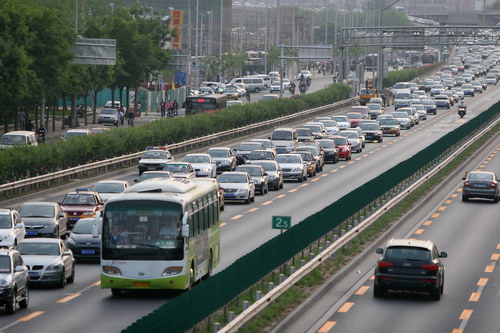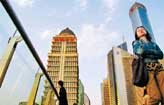Economy
Higher parking fees in Beijing lead to less private car use
Updated: 2011-07-27 09:39
By Xu Wei (China Daily)
 |
|
Officials say the drop in the use of private vehicles has been matched by increased use of public transport. [Photo/China Daily] |
BEIJING - Statistics show the number of citizens in Beijing using private vehicles as their primary means of daily transport decreased for the first time in recent years after the city raised parking fees in April.
 |
Guo Jifu, director of the Beijing Transportation Research Center, said in a live interview with eBeijing, the official website of the Beijing government, that the center had recorded a 1.5 percent decrease in the use of private vehicles and a 3.5 percent increase in public transport over the past three months.
In April, Beijing increased parking fees in non-residential areas by changing the pricing unit from 30 minutes to 15 minutes, which, according to Guo, largely accounts for the change in people's choice of daily transport.
"This is the first time in recent years that there has been a decrease in the use of private vehicles," Guo said. "It's an immediate result of changes to parking fees."
"We can get clues from the research result that the city's road congestion is improving and the government's policy of encouraging the use of public transport is working positively," said Yu Lingyun, a transport expert of Tsinghua University.
According to Guo, the research center also investigated the parking choices of more than 2,400 car owners.
The result showed 23 percent of the car owners chose underground parking lots and 37 percent parked near their homes or in free parking lots, indicating the strong effect of the rise in parking charges. However, the unavailability of parking spaces also affected motorists' choices."I prefer taxis or walking when I go to lunch or shopping, because I simply cannot find a parking place in some areas," said 26-year-old Liu Yang, a Beijing resident.
The lack of parking lots, according to experts, is a result of poor city planning before the 1980s, when new buildings seldom included parking lots.
"City planning at that time never foresaw there being so many private cars now," Yu Lingyun said.
However, Guo Jifu denied the solution to the problem was to build new parking lots.
"More parking lots will certainly be an incentive to private car owners," Guo said, saying London and Tokyo banned the building of new parking lots decades ago.

Specials

Turning up the heat
Traditional Chinese medicine using moxa, or mugwort herb, is once again becoming fashionable

Ciao, Yao
Yao Ming announced his retirement from basketball, staging an emotional end to a glorious career.

Financial sector short of talent
Lack of skilled professionals in Shanghai inhibiting the city's development as a financial hub